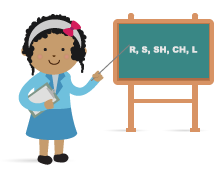
An articulation disorder is a speech sound disorder in which a child has difficulty making certain sounds correctly. Sounds may be omitted or improperly altered during the course of speech. A child may substitute sounds (“wabbit” instead of “rabbit”) or add sounds improperly to words. Young children will typically display articulation issues as they learn to speak, but they are expected to “grow out of it” by a certain age. If the errors persist past a standard developmental age, which varies based on the sound, then that child has an articulation disorder.
The most common articulation disorders are in the form of a “lisp” – when a child does not pronounce the S sound correctly – or when a child cannot pronounce the R sound correctly. He may say “wabbit” instead of “rabbit” or “buhd” or instead of “bird.”
The two most important factors in understanding a speech or articulation disorder are:
- The type of speech sound error(s) your child is making
- The age of your child
The most common articulation disorders begin to present themselves between the ages of 3 and 6. As different sounds are mastered at different stages in a child's development, the appropriate age to begin seeking treatment will depend in part on the sound that your child is having difficulty pronouncing.
Age 3: Children generally master sounds K and G. Errors may be seen as: "Tat instead of Cat" or "Doal instead of Goal."
Age 4: Children generally master the L sound. Errors may be seen as: "Wesson instead of Lesson."
Age 5: Children generally master the "Sh," "Ch," and "Th" sounds. Errors may be seen as "Sape" instead of "shape," "Sicken" instead of "Chicken," or "Fink instead of Think."
Age 6: R is the most difficult sound to master and is usually able to do so by age 6. Errors may be seen as "Wabbit" instead of "Rabbit," or "Buhd instead of Bird."
Speech Buddies were specifically designed to treat articulation disorders and have been clinically proven to work twice as fast as traditional therapy in resolving this type of speech problem. Other treatment methods include one-on-one or group lessons with a licensed Speech-Language Pathologist (SLP). Most public schools provide speech services, yet children with articulation disorders may not qualify to receive free services because their problem is not considered “bad enough.” Private speech therapy lessons are also available in most cities and towns across the country.
To understand how to use Speech Buddies to treat an articulation challenge, download a sample practice plan for your child.
Apraxia of Speech, Autism, Cerebral Palsy, Cleft Palate, Down syndrome, Fragile X Syndrome, Language Disorder, Speech Delay, Stuttering

Please contact us for immediate help with your request.
![]() 1-866-247-8030
1-866-247-8030
![]() info@speechbuddies.com
info@speechbuddies.com
Outside of business hours? You will be contacted as soon as we are open.
To choose a new speech therapist, please contact us.
![]() 1-866-247-8030
1-866-247-8030
![]() info@speechbuddies.com
info@speechbuddies.com
Outside of business hours? You will be contacted as soon as we are open.
You can reschedule your appointments anytime. We ask that you give us at least 24 hours notice to avoid any unnecessary fees or complications. You will not be charged for any of your sessions until the day of that appointment.
Your speech therapist likely gave you a recommended treatment plan in your first session. If not, make your best guess – you can always modify your package later.
Your message has been sent. or close this window to continue.
Your discount code will be sent to your email shortly.
 I am a parent
I am a parent
 I am a Speech Therapist
I am a Speech Therapist